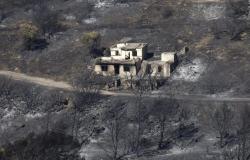Officers, cadets, non-commissioned officers, petty officers, parachute porpoises, quartermasters and sailors, aviators.
From the night of June 5 to 6, 1944, even before the Normandy beaches, the sky and forests of Brittany were the scene of fierce fighting.
“The arrow will not pass.” The message sent the day before marked the departure of resistance groups from Morbihan towards Saint-Marcel. Between Saint-Marcel and Plumelec, around twenty French paratroopers were dropped into the heart of the enemy system to assist the determined and courageous Breton resistance fighters.
In a few days, no less than 500 men from the fourth Free French Air Infantry Battalion, integrated into the Special Air Service, British SAS, parachuted.
Here fell the first soldier of the landing: a French soldier, a young sailor from Côtes d’Armor, Corporal Émile Bouétard had chosen to join General De Gaulle. Arriving in London after many perils, he gave up sea duty to join the Air Infantry. He wanted to be among the first to set foot on French soil when the time for liberation came. He kept his promise at the cost of his life. Émile Bouétard symbolically unites in Saint-Marcel two fighting worlds which are one: the Breton resistance fighters, the French Forces of the Interior, and Free France. It is this memory that we share here in Plumelec, on this day.
The cornerstone of the Atlantic Guard, Brittany experienced an occupation that was all the harsher as its strategic importance was strong. On the coasts as well as inland, in all social categories, the refusal of defeat and humiliation led many Bretons to take action against the occupier. Some, as early as 1940, took to the sea to join the Free French Forces; others remained in France to exfiltrate Allied airmen, spy, sabotage German installations; finally, some had the courage to offer refuge to the hunted, like the Morbihan gendarmerie company of Commander Guillaudot.
The repression was fierce: 380 resistance fighters were shot in occupied Brittany, more than 3,500 were deported, half of whom never returned. These men and women served in the regiment without a flag that Pierre Brossolette speaks of, the one whose sacrifices and battles are not inscribed in golden letters in the quivering of silk but only in the fraternal and torn memory of those who survive.
The bravery and determination of these united fighters played a major role in the liberation of our country. Their heroic actions leave an indelible mark on our history.
How can we forget the epic struggle of those at the Nouette camp, near Saint-Marcel, who repulsed two German assaults in terrible conditions before dispersing to continue the fight, how can we forget that they thus prevented thousands of German soldiers to join the Norman front.
French paratroopers, for their part, had already distinguished themselves on numerous battlefields, in Libya, in Crete, in Tunisia. In the din of combat, their uniform represented the vitality of the Franco-British alliance, their faces embodied the universality of General De Gaulle’s appeal. Polynesians, New Caledonians, Blackfoot from North Africa, early volunteers and escapees from occupied France, they made up this sky battalion, a non-conformist unit commanded by Pierre-Louis Bourgoin, the one-armed man.
Corporal Bouétard’s companions were an avant-garde. The following days, 160 paratroopers from the Fourth SAS jumped on Saint-Marcel. Among them, Lieutenant Pierre Marienne, who rests there, and was shot on July 12, 1944 with 6 paratroopers, 8 FFI and 3 farmers. Among them, Meyer Sassoon, a British doctor, joining the FFL, died for France in January 1945.
Among them, a 19-year-old young man named Achille Muller. He stands there, at our side, carrying the memory of his brothers in arms, the ghosts of his youth.
So here, in Sérent, in Plumelec, in Saint-Marcel, the meeting between the paratroopers of Free France and the FFI brought about in the heart of Brittany, a little France, an island of freedom raised against infamy and barbarism. Here, the FFI saw by looking at the SAS that they had an army whose will to win was more alive than ever. Here, the SAS saw by looking at the FFI that they belonged to a fighting nation which had not disintegrated under the poison of collaboration. A nation in arms, striving for victory.
Today, this invaluable legacy of the SAS is maintained within the special forces. 1st Marine Infantry Parachute Regiment: the SAS of Free France, from the Air Infantry groups are the fathers that you have chosen and that we recognize in you as a moral heritage, which takes here today today all his strength and greatness. The Air Parachute Commandos present here, their successors within the Air and Space Force, are your brothers. It is together that you can proudly take up this traditional name. Elite unit with Marine commandos, swimmers, Dragons present where the best interest of the nation requires it, you know that who dares wins outside the box and preconceived plans. A unit of the impossible, like the Oceanic SAS in the past, you cross the skies, the oceans, the seas, symbol of the vitality of our spirit of defense while the dangers mount. Like the resistance fighters and the SAS of Saint-Marcel, you remind us that we are ready to make the same sacrifices to defend what is most dear to us: our land of France and our republican values.
Here, this glorious memory does not only live in books, in commemorations. It is embodied, shared, transmitted, by the action of the Resistance Museum in Brittany, by the commitment of the defense class teachers present here, by all the initiatives taken or encouraged at Plumelec, at Saint Marcel, at Séran, everywhere in the territory.
Because these places full of history oblige us; the courage, sacrifices and successes of the French maquisards and SAS nourish our moral strength and their prowess must remain alive in our hearts and in our minds.
I know our country is strong in bold, valiant youth, ready for the same spirit of sacrifice as its elders.
Officers, cadets, non-commissioned officers, petty officers, parachutist porpoises, quartermasters, sailors, airmen, and you, elected representatives of the Republic, French people, all of us, let us live up to our heritage of bravery. This is the legacy of the Breton and French resistance and of our liberators.
Long live Brittany, long live the Republic, long live France!






